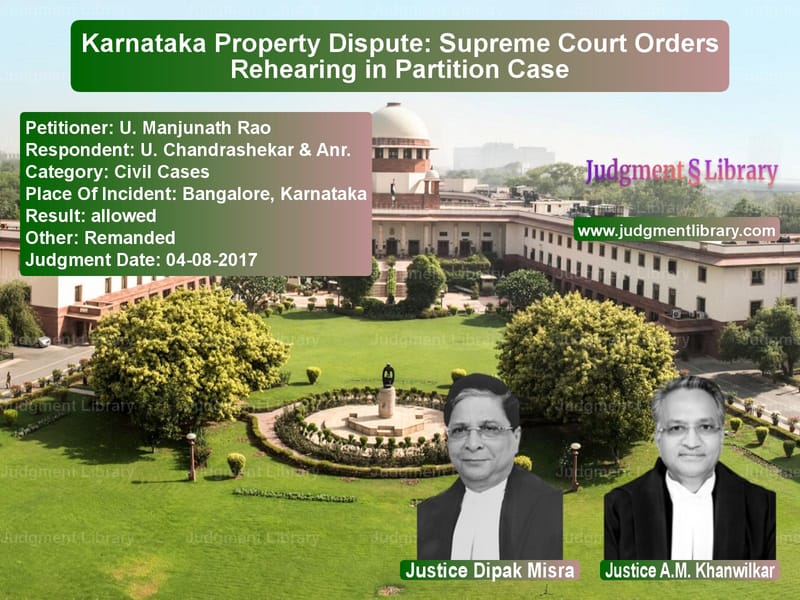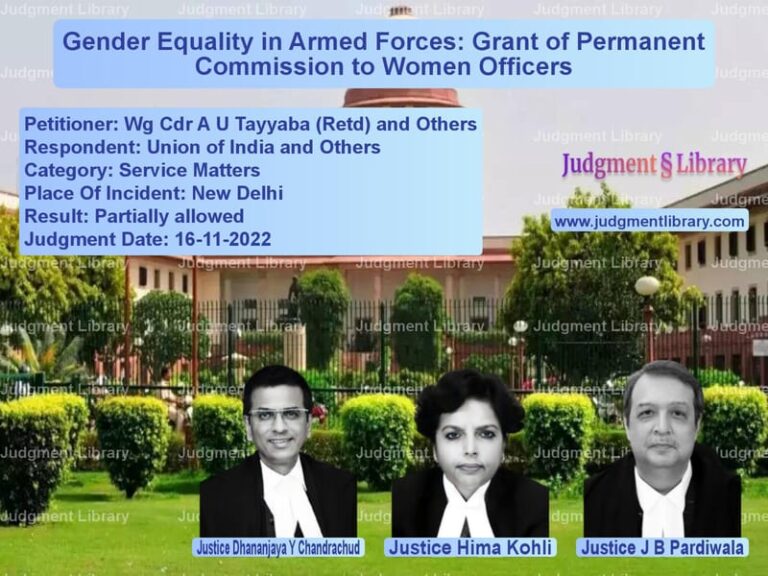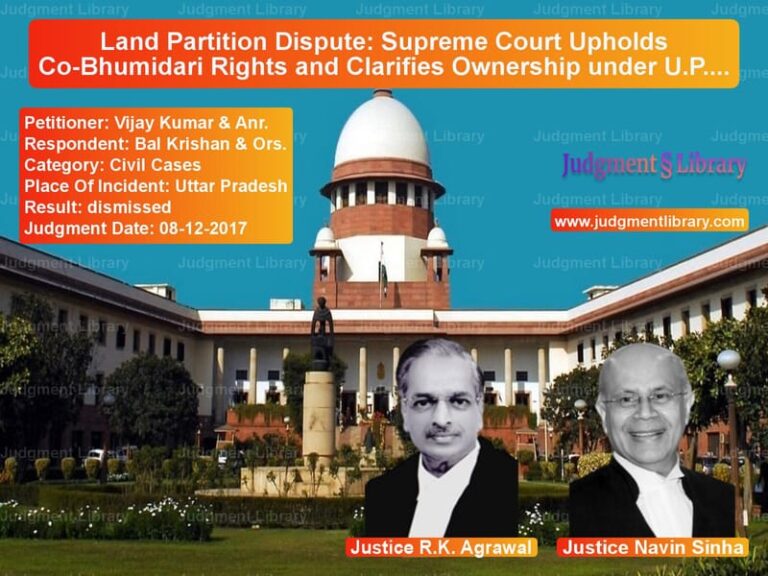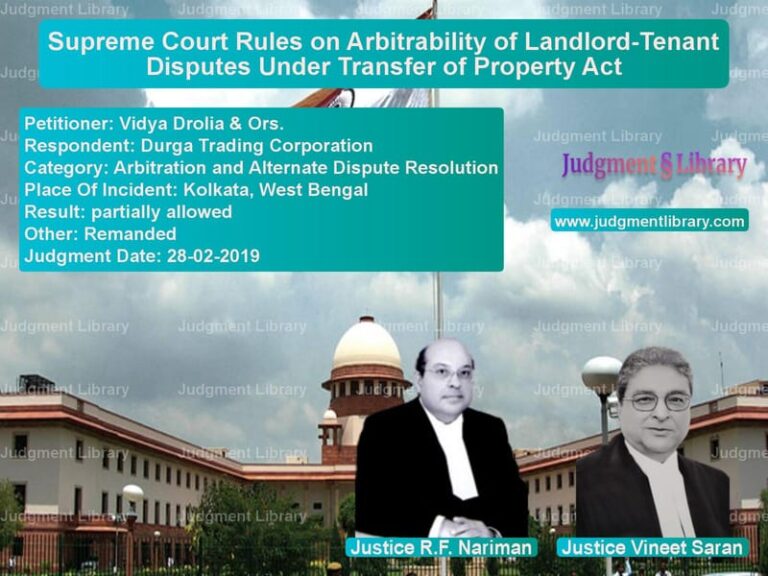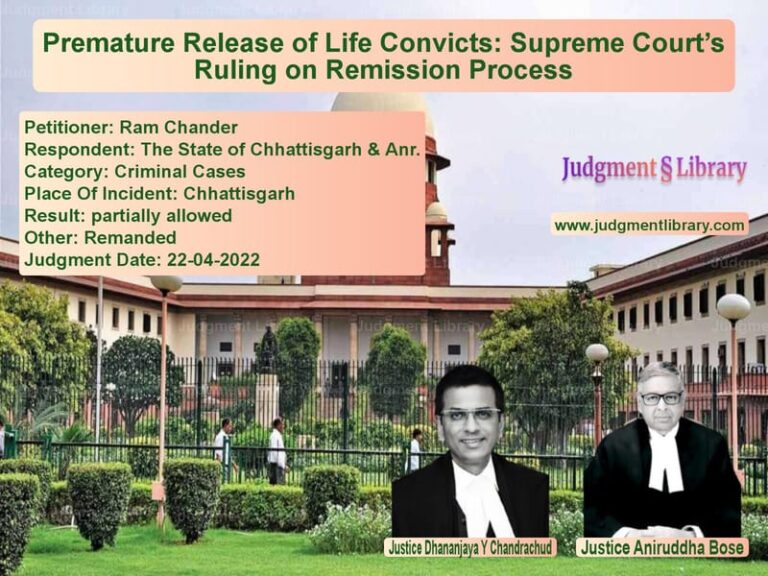Karnataka Property Dispute: Supreme Court Orders Rehearing in Partition Case
The case of U. Manjunath Rao vs. U. Chandrashekar & Anr. involved a dispute over the rectification of a partition deed and possession rights concerning ancestral property. The Supreme Court was tasked with determining whether the Karnataka High Court had appropriately decided the appeal in a property dispute.
Background of the Case
The dispute arose from a property partition deed dated April 1, 1981, which was registered on July 28, 1981. The partition deed was later challenged due to an error in property description. The plaintiff, U. Chandrashekar, sought the rectification of the partition deed and a permanent injunction restraining the defendants from interfering with his possession of the property.
The trial court ruled in favor of the plaintiff, directing the first defendant, U. Manjunath Rao, to execute a rectification deed to correct the property description in the partition deed. The Karnataka High Court upheld the trial court’s decision without conducting an in-depth analysis of the evidence, leading to an appeal before the Supreme Court.
Arguments Presented
Appellant’s Arguments (U. Manjunath Rao)
The appellant, U. Manjunath Rao, contended that:
- The High Court failed to properly analyze the oral and documentary evidence before upholding the trial court’s judgment.
- The plaintiff had not presented sufficient evidence to prove the existence of a joint family.
- The property in question was acquired by the first defendant through his own funds and was not part of the joint family estate.
- The rectification deed was being sought after a long delay of over 22 years, raising doubts about the authenticity of the claim.
Respondents’ Arguments (U. Chandrashekar & Anr.)
The respondents argued that:
- The partition deed explicitly described the property as part of the joint family estate.
- The rectification was necessary to correct a clerical error in the property description.
- The trial court had correctly assessed the facts and granted the appropriate relief.
- The High Court’s decision was valid and did not warrant interference.
Supreme Court’s Observations
The Supreme Court examined whether the High Court had properly discharged its duty as the first appellate court. It observed:
“It is clearly demonstrable that the High Court has neither analysed the evidence brought on record nor has it answered the issues raised in law.”
The Court further criticized the High Court for failing to conduct a detailed examination of the issues:
“Stating the facts and thereafter reproducing few passages from the trial Court and ultimately referring to certain exhibited documents in a cryptic manner will not convert an unreasoned judgment to a reasoned one.”
Regarding the need for reasoned judgments, the Court emphasized:
“The reason is the life of law. Absence of analysis not only evinces non-application of mind but mummifies the core spirit of the judgment.”
The Supreme Court cited previous rulings, including Santosh Hazari v. Purushottam Tiwari, which held that the first appellate court must record findings with reasons on all issues raised.
Final Judgment
The Supreme Court ruled in favor of the appellant and set aside the Karnataka High Court’s judgment. The Court directed the High Court to rehear the appeal and decide the matter afresh by conducting a proper analysis of the facts and law.
The Court issued the following directions:
- The High Court must reconsider the appeal and pass a reasoned judgment within six months.
- The parties should appear before the High Court on the scheduled date to facilitate the rehearing.
- Until the High Court’s final decision, no further changes should be made to the property status.
The Supreme Court concluded:
“We allow the appeal, set aside the impugned judgment and decree passed by the High Court, and remit the matter for fresh disposal in accordance with law.”
Implications of the Judgment
This ruling has significant implications for property disputes and appellate procedures:
- It reinforces that appellate courts must provide reasoned judgments based on proper legal analysis.
- The decision prevents lower courts from merely restating trial court findings without conducting independent scrutiny.
- It ensures that property disputes involving alleged clerical errors in partition deeds are thoroughly examined.
- The judgment establishes a precedent for requiring higher courts to address key factual and legal issues when reviewing trial court decisions.
Conclusion
The Supreme Court’s ruling in this case upholds the principle that appellate courts must exercise their duty to analyze both legal and factual issues in detail. By remanding the case for proper reconsideration, the Court ensures that the parties receive a fair hearing based on thorough judicial reasoning.
Don’t miss out on the full details! Download the complete judgment in PDF format below and gain valuable insights instantly!
Download Judgment: U. Manjunath Rao vs U. Chandrashekar & A Supreme Court of India Judgment Dated 04-08-2017.pdf
Direct Downlaod Judgment: Direct downlaod this Judgment
See all petitions in Property Disputes
See all petitions in Landlord-Tenant Disputes
See all petitions in Specific Performance
See all petitions in Judgment by Dipak Misra
See all petitions in Judgment by A M Khanwilkar
See all petitions in allowed
See all petitions in Remanded
See all petitions in supreme court of India judgments August 2017
See all petitions in 2017 judgments
See all posts in Civil Cases Category
See all allowed petitions in Civil Cases Category
See all Dismissed petitions in Civil Cases Category
See all partially allowed petitions in Civil Cases Category

